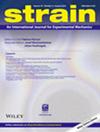Measuring coarse grain deformation by digital image correlation
IF 1.8
3区 材料科学
Q2 MATERIALS SCIENCE, CHARACTERIZATION & TESTING
引用次数: 2
Abstract
This work presents results from oedometric compression of coarse granular material. Coarse granular media exhibit significant deformations making it complicated to predict the settlement of structures. In this paper, a measurement technique was developed for the analysis of two‐dimensional (2‐D) images of a deforming coarse granular medium to investigate its deformation. This was achieved by realising grain‐based image correlation to measure the grain transformation in gravel with the use of a digital image correlation technique. The 2‐D displacement fields enable us to explore the behaviour of granular media at different scales: microscopic, mesoscopic and macroscopic scales. The mesoscopic scale is defined from branches that connect the centres of three neighbouring grains, using a Delaunay triangulation to account for an equivalent continuum media. Whereas the consistency of the macroscopic strain and the average mesoscopic strain is assessed, it is shown that a deviation from the normalised microscopic vertical displacement is an indicator of the heterogeneity of the mesoscopic strain field. The proposed mesoscopic analysis allows us to investigate these heterogeneities. Another important result is that even if the amplitude of the microscopic strain is small (approximately 100 times smaller) compared with the other strain measures, it confirms that the grains are not rigid and that their ultimate strain can be estimated using the proposed approach.用数字图像相关法测量粗晶粒变形
这项工作介绍了粗颗粒材料固结压缩的结果。粗颗粒介质表现出显著的变形,使得预测结构沉降变得复杂。本文开发了一种测量技术,用于分析变形粗颗粒介质的二维(2D)图像,以研究其变形。这是通过使用数字图像相关技术实现基于颗粒的图像相关来测量砾石中的颗粒变化来实现的。二维位移场使我们能够在不同尺度上探索颗粒介质的行为:微观、介观和宏观尺度。介观尺度是由连接三个相邻晶粒中心的分支定义的,使用Delaunay三角测量来解释等效的连续介质。尽管评估了宏观应变和平均介观应变的一致性,但结果表明,与归一化微观垂直位移的偏差是介观应变场不均匀性的指标。所提出的介观分析使我们能够研究这些异质性。另一个重要的结果是,即使微观应变的振幅与其他应变测量值相比很小(大约小100倍),它也证实了晶粒不是刚性的,并且可以使用所提出的方法来估计它们的极限应变。
本文章由计算机程序翻译,如有差异,请以英文原文为准。
求助全文
约1分钟内获得全文
求助全文
来源期刊

Strain
工程技术-材料科学:表征与测试
CiteScore
4.10
自引率
4.80%
发文量
27
期刊介绍:
Strain is an international journal that contains contributions from leading-edge research on the measurement of the mechanical behaviour of structures and systems. Strain only accepts contributions with sufficient novelty in the design, implementation, and/or validation of experimental methodologies to characterize materials, structures, and systems; i.e. contributions that are limited to the application of established methodologies are outside of the scope of the journal. The journal includes papers from all engineering disciplines that deal with material behaviour and degradation under load, structural design and measurement techniques. Although the thrust of the journal is experimental, numerical simulations and validation are included in the coverage.
Strain welcomes papers that deal with novel work in the following areas:
experimental techniques
non-destructive evaluation techniques
numerical analysis, simulation and validation
residual stress measurement techniques
design of composite structures and components
impact behaviour of materials and structures
signal and image processing
transducer and sensor design
structural health monitoring
biomechanics
extreme environment
micro- and nano-scale testing method.
 求助内容:
求助内容: 应助结果提醒方式:
应助结果提醒方式:


